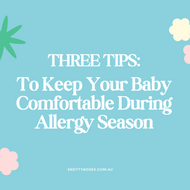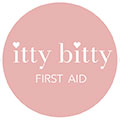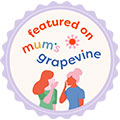Spring Allergy Survival Guide: 3 Essential Tips to Keep Your Baby Comfortable
Posted by Emma, Snotty Noses HQ on 23rd Aug 2024
How to Keep Your Baby Comfortable During Allergy Season
As Spring arrives, many of us are eagerly anticipating the warmer weather, blooming flowers, and longer days.
However, for some, Spring also marks the beginning of allergy season. A time when pollen and other allergens can turn a beautiful season into a challenging one.
As a parent, your baby’s comfort and well-being are always top priorities, especially during allergy season.
Allergens like pollen, dust mites, and pet dander can easily find their way into your home, making it challenging to keep your little one free from discomfort. Virus germs are also present (especially for kids attending daycare).
Fortunately, with a few proactive steps, you can create a healthier, more comfortable environment for your baby.
Here are three essential tips to help you get started:
1. Maintain Clean Indoor Air
Tip: Use air purifiers and humidifiers to keep the air in your home clean and allergen-free. It’s important to regularly clean or replace filters to ensure that they effectively trap pollen, dust mites, and other airborne allergens.
Why It Helps: Babies have delicate respiratory systems that are more susceptible to irritants in the air. By maintaining clean indoor air, you can significantly reduce their exposure to allergens, helping to prevent or alleviate allergy symptoms like sneezing, coughing, or congestion. Keeping the humidity at an optimal level with a humidifier can make a world of difference in your baby’s comfort.
2. Hypoallergenic Bedding and Clothing
Tip: Choose hypoallergenic bedding and clothing for your baby to reduce skin irritation and allergic reactions. Look for materials that are breathable, gentle on the skin, and free from common allergens. Wash sheets and pillow cases once a week.
Why It Helps: Hypoallergenic fabrics minimise the risk of allergens like dust mites and pet dander accumulating in your baby's sleeping environment, helping to prevent allergic flare-ups and ensuring a more comfortable experience.
BONUS TIP: Add a few drops of Healthy Home Essential Oil (containing Lemon, refreshing Spearmint and cleansing Tea Tree and Eucalyptus) to the washing machine for extra freshness. You can also use this oil in the mop bucket and a surface spray for benchtops.
This is the brand we mention in our youtube video.
3. Use Saline & Nasal Aspirator for Relief
Tip: Gently use a combo of saline nasal spray and a nasal aspirator to clear your baby’s nasal passages of mucus and allergens, especially before feeds and bedtime.
This can help ease breathing and improve sleep quality.
Why It Helps: Unlike adults, babies can’t blow their noses to clear out mucus and allergens that build up in their nasal passages. Using a nasal aspirator helps to relieve congestion, making it easier for your baby to breathe comfortably. Regular use, especially during allergy season, can reduce the risk of sinus infections and help your baby sleep better at night.
BONUS TIP: Snotty Boss will reduce discomfort caused by constant blowing of the nose. Remember, the Snotty Boss kit contains a refillable saline spray bottle (and this link has a DIY recipe for homemade saline).
By following these simple tips, you can create a more comfortable environment for your child during allergy season.
Clean air, regular washing, and effective nasal care are all essential steps to keeping your little one happy and healthy.
Remember, a comfortable baby is a happy baby, and these proactive measures will help ensure that your baby can enjoy the season with minimal discomfort.
Disclaimer: We are not doctors, healthcare professionals, or aromatherapists. Our products are offered for sale with general use guidelines provided by the manufacturer. Should any sensitivity to our products occur, please discontinue use. Our products are not intended to diagnose, treat, and/or take the place of medical treatment prescribed by a doctor or medical professional.
















